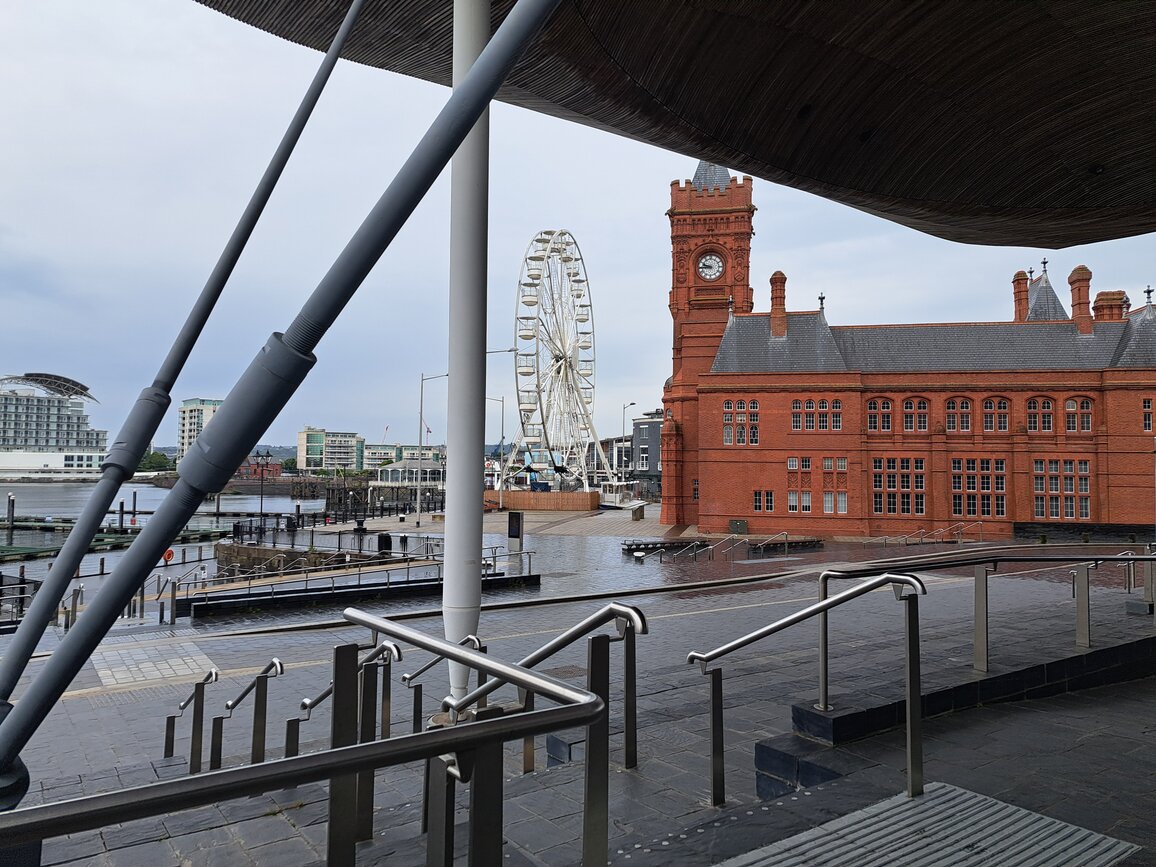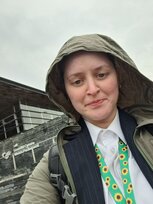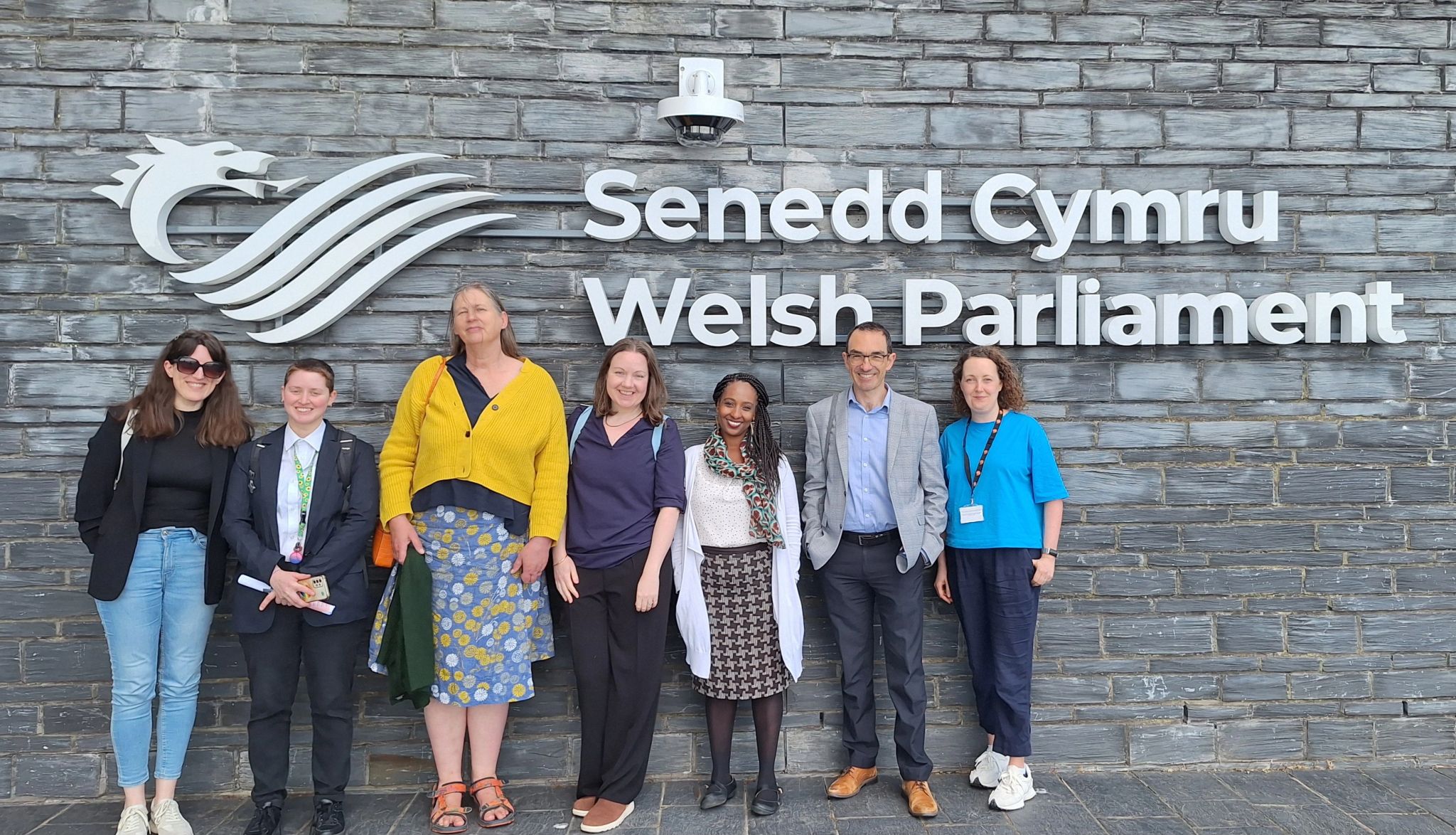A Day at the Senedd

In May, I took a direct train to Cardiff and headed to the Senedd (Welsh Parliament). Jayne Rowe, Impact Manager for FACE, and I, Impact Manager for SALS, are part of a new network of impact managers and knowledge mobilisers from Welsh universities, called Y Twndis (funnel!). The day was a chance to finally meet people in person, having only seen each other in Microsoft Teams boxes up until now.

(I don't do selfies!)
After passing through airport-style security at the entrance, I waited in the beautiful and imposing foyer. At 10am, Dr Sarah Morse—Knowledge Exchange Manager commissioned to work at the Senedd and general brains behind Y Twndis—arrived to greet everyone. It felt a bit like COVID flashbacks, noticing how much taller everyone is in real life!
The Senedd is one of the most sustainable and inclusive parliaments in the world. Built with durable materials and fully bilingual, it's also preparing for big changes: in 2026, a new voting system will increase the number of Members per area to six, based on population. They’re currently working on expanding the main plenary chamber to accommodate this.
As part of our visit, Sarah had booked us passes to attend a session of the Culture, Communications, Welsh Language, Sport, and International Relations Committee (yes, it’s a mouthful). We crept into the public gallery with our translator packs and looked down on the committee in session. We even got a little wave from MS Gareth Davies, who was there along with Mick Antoniw MS. The session was chaired—brilliantly—by Delyth Jewell MS. The smooth switching between English and Welsh was fascinating to watch, and the translators in my earpiece did a fantastic job keeping up.
At the time, the Committee was hearing from the Chief Executive Officer of Visit Britain and the Head of Wales Arts International, who were giving evidence on the Welsh Government’s International Strategy. Earlier that day, Prof. Siraj Shaikh, a systems security academic from Swansea University, had spoken as a tech expert. The role of the Committees is to gather evidence and insights on current issues—nothing scary! It’s really not that different from presenting at a conference and answering a few clarifying questions. Members aren’t there to grill you; they’re there to learn.
Committees are made up of Members from across the political spectrum, but the aim isn’t party politics. Instead, they bring together people with shared interests to work towards positive change.
Academics can submit written evidence to a Committee call or Area of Research Interest (ARI) using Senedd guidance. If you’re an expert or have relevant research, this is one of the most direct ways to get your work in front of decision-makers. Just make sure your submission is short, accessible, and focused—skip the methodology and go straight to results, conclusions, and implications. Parliamentary researchers may sift through hundreds of submissions to prepare briefs for Members and summary reports for the website.
Committee Members do receive all the raw evidence, but they’re unlikely to wade through long, rambly documents. These are elected officials—they want the facts, and they want them now.
Academics might also be invited to give oral evidence, like Prof. Shaikh did. This means sitting in with the Committee and possibly alongside other witnesses. You can ask for a "steer" beforehand (essentially an insight into what they’ll ask), which helps with prep. And if you don’t know the answer to something? It’s absolutely fine to say so—it’s not a viva. You can even suggest someone else who might know.
If you would rather not attend in person, that is absolutely fine. The written evidence will still be condensed by Parliament researchers into a brief for the committee and still feature in the report on the website.
Giving evidence at the Senedd could be just the start of a long journey – academics must follow-up with where the evidence has taken the Members. If the evidence leads to recommendations that the Government adopts, that is some high quality impactful research.
Anyone can sit in the public gallery of a Committee or Plenary session. So if you’re curious about how it all works but not quite ready to dive in, just book a seat (three weeks in advance). And if you’re invited to give evidence, why not bring your research team along to watch? Cardiff’s not a bad day out!
After the Committee session, Y Twndis gathered in a private room for some reflection on how best to support academics invited as witnesses. We were joined by Chloe Corbyn (no relation to Jeremy—I checked), a Knowledge Exchange Lead also commissioned to the Senedd.
The highlight of the day, naturally, was lunch. We ate in the Senedd canteen, mingling with the upper echelons over surprisingly cheap and tasty food that catered to all diets. On our way out, we even spotted First Minister Eluned Morgan.
We caught part of a Plenary session too—the full meeting of all 60 Members, which takes place on Tuesday and Wednesday afternoons. We listened to Jane Hutt MS respond to the UK Supreme Court’s recent ruling on the “definition of a woman”—a topic I found particularly relevant. The debate was intense, with emotionally charged language and some pointed exchanges. It was interesting to witness, though quite challenging to follow at times.
Finally, we were given a short tour of the building by a friendly guide, and then it was time to get a taxi back to the station, but not before we got a quick pic!
📷 Sarah Morse
Overall, the atmosphere at the Senedd was genuinely welcoming. It’s bizarre to think that such an important building is so accessible to the public. I’d highly recommend a visit—whether you’re just curious, want to grab a coffee upstairs, or are thinking about watching/contributing to a Committee or Plenary session. Cardiff awaits.
If you’re interested, Jayne and I will be hosting a training session on this topic in the next academic year – so keep your eyes open.
Dr Emma Harrison, Research Impact Manager for the Faculty of Social and Life Sciences, and Visiting Researcher in Psychology
